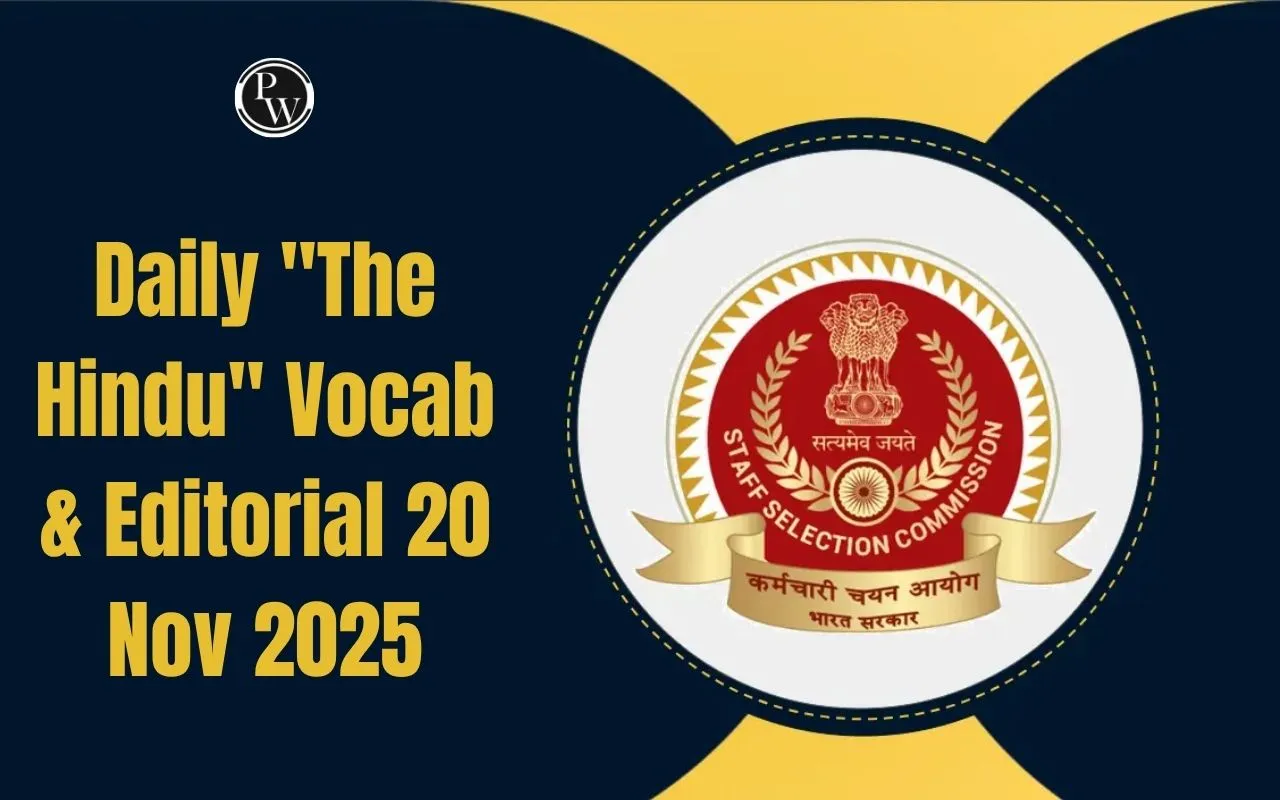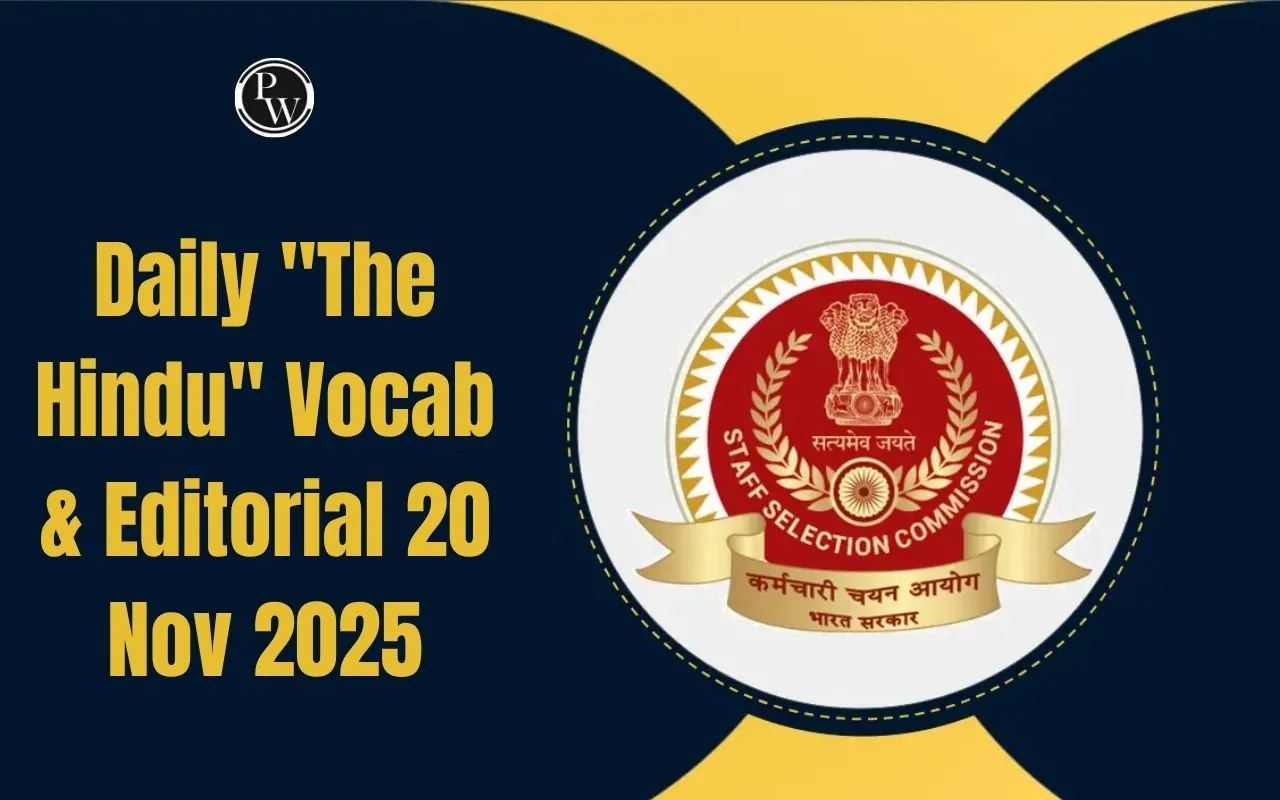

Daily “The Hindu” Vocab & Editorial – 20 Nov 2025 is very useful for SSC and Railway exam students. It helps you learn new English words, understand their meanings, and see how they are used in real newspaper sentences. By going through today’s editorial carefully, you will also improve your grammar, sentence structure, and overall understanding of current issues.
If you follow this daily, you will stay in touch with important topics throughout the year and will not feel pressure at the time of exams. Regular reading of the 20 Nov 2025 editorial and vocab will slowly improve your reading speed, comprehension, and confidence for exams like SSC CHSL, CGL, CPO, RRB NTPC, Railway Group D, and other competitive exams.
Daily "The Hindu" Vocab & Editorial 20 November 2025
Daily "The Hindu" Vocab & Editorial 20 Nov 2025 gives very useful word meanings with easy examples. It is helpful for all students preparing for competitive exams like SSC, Railways, Banking, and other government exams. Today’s edition includes many important words that often appear in national news, political debates, and editorial articles.
You may also see these words in the SSC English section in vocabulary, cloze test, and reading comprehension questions. By going through today’s list carefully, you can learn each word’s meaning, how it is used in a sentence, and the correct context. This will help you use these words confidently in your own writing and improve your understanding of English passages in exams.
Daily "The Hindu" Vocab & Editorial 20 November 2025
The Hindu Vocabulary 20 November 2025
Below, we have provided a detailed vocabulary list from today’s Hindu newspaper:
Breaking the rules
-
Part of Speech: phrase
-
Meaning: acting against established laws or norms
-
Hindi: नियमों का उल्लंघन
-
Synonyms: violating rules, disobeying, breaching, infringing, defying
-
Antonyms: obeying, following, complying, adhering
-
Example: Breaking the rules in environmental laws can cause long-term damage.
Illustrates
-
Part of Speech: verb
-
Meaning: to explain or demonstrate clearly
-
Hindi: दर्शाता है
-
Synonyms: shows, depicts, explains, clarifies, exemplifies, demonstrates
-
Antonyms: hides, obscures, conceals, misrepresents
-
Example: This illustrates how difficult it is to undo the impact of a faulty law.
Mandated
-
Part of Speech: verb (past participle)
-
Meaning: officially required
-
Hindi: अनिवार्य किया गया
-
Synonyms: required, ordered, imposed, directed, decreed, commanded
-
Antonyms: optional, voluntary, discretionary
-
Example: The law mandated a prior EC for all industries.
Impermissible
-
Part of Speech: adjective
-
Meaning: not allowed
-
Hindi: अस्वीकार्य / अनुमत नहीं
-
Synonyms: unacceptable, prohibited, forbidden, barred, unlawful
-
Antonyms: permissible, allowed, acceptable, lawful
-
Example: The Court found post-facto EC impermissible in earlier judgments.
Ex ante
-
Part of Speech: adverb / phrase
-
Meaning: before the event
-
Hindi: पूर्व दृष्टिकोण से
-
Synonyms: beforehand, in advance, priorly
-
Antonyms: ex post, afterwards, later
-
Example: The EC regime remains ex ante in spirit
Cumulative
-
Part of Speech: adjective
-
Meaning: increasing or growing by successive additions
-
Hindi: संचयी / कुल मिलाकर
-
Synonyms: collective, combined, overall, aggregated, total, accumulative
-
Antonyms: individual, separate, isolated
-
Example: EIA examines the cumulative impact of a project.
Rationale
-
Part of Speech: noun
-
Meaning: the reasoning or logic behind something
-
Hindi: तर्क / आधार
-
Synonyms: reasoning, justification, explanation, logic, basis, grounds
-
Antonyms: illogic, baselessness, irrationality
-
Example: Post-facto EC defeats the rationale of prior environmental assessment.
Assessed
-
Part of Speech: verb
-
Meaning: evaluated or examined
-
Hindi: मूल्यांकन किया
-
Synonyms: evaluated, examined, studied, analysed, reviewed, judged
-
Antonyms: ignored, overlooked, neglected
-
Example: Projects must be assessed before receiving clearance.
Replicate
-
Part of Speech: verb
-
Meaning: to reproduce or match exactly
-
Hindi: दोहराना / प्रतिकृति बनाना
-
Synonyms: reproduce, copy, imitate, mirror, duplicate
-
Antonyms: differ, vary, alter, change
-
Example: A post-facto EC cannot replicate the purpose of prior evaluation.
Ex post
-
Part of Speech: adverb / phrase
-
Meaning: after the event
-
Hindi: घटना के बाद
-
Synonyms: afterwards, later, retrospectively
-
Antonyms: ex ante, beforehand, prior to
-
Example: Post-facto clearance is an ex post approval.
Phrases from the Editorial
Call into question
-
Meaning: to doubt or challenge
-
Hindi: शक करना / प्रश्न उठाना
-
Example: The ruling calls into question the misuse of EC rules.
Set a precedent
-
Meaning: to establish a legal example for future cases
-
Hindi: मिसाल स्थापित करना
-
Example: The judgment sets a precedent for future EC decisions.
In line with
-
Meaning: consistent with
-
Hindi: अनुरूप
-
Example: The new ruling is in line with earlier judgments.
Also Read: SSC Monthly Current Affairs 2025
Para Jumble 20 November 2025
As heart disease continues
P. increasingly interested in identifying the
Q. to be the number one killer
R. researchers have become
S. in the United States
Complete line given below the options:
-
Potential risk factors that trigger heart attack
Options:
A. PSRQ
B. RQSP
C. SPRQ
D. QSRP
Answer: D (QSRP)
(So the correct sentence is:
As heart disease continues to be the number one killer in the United States, researchers have become increasingly interested in identifying the potential risk factors that trigger heart attack.)
Error Spotting (Grammar)
Sentence:
Shubham didn't knew / where to keep his books / so he left them / lying on the table.
Options:
a. so he left them
b. lying on the table
c. Shubham didn't knew
d. where to keep his books
Answer: c. Shubham didn't knew
(Correct form: Shubham didn’t know.)
Antonym / Vocabulary
Desecrate
a. Sanctify
b. Profane
c. Befoul
d. Defile
Answer: a. Sanctify
Idiom & Phrase
Sentence:
The teacher tried to hammer home the importance of discipline.
What does hammer home mean?
A. Repeat forcefully
B. Ignore
C. Forget
D. Cancel
Answer: A. Repeat forcefully
The Hindu Editorial Paragraph Analysis 20 Nov 2025
Breaking the rules: On the reversing of the Vanashakti ruling
Post-facto clearance must remain the exception, not the rule
Editorial Passage
-
The majority decision by a Bench of the Supreme Court to reverse its May 2025 order, which had stayed the grant of post-facto environmental clearances, illustrates the difficulty of dealing with the seemingly irreversible consequences of a much-abused law.
-
The controversy is also about the form of the Environment Ministry’s instruments that normalised those exceptions. The Environment (Protection) Act 1986 and EIA notifications of 1994 and 2006 are framed around prior environmental clearance (EC), which means that large construction and industrial projects must not start work until an authority has assessed their consequences.
-
Decisions by the Court including Common Cause (2017) and Alembic Pharmaceuticals (2020) treated post-facto EC as impermissible where prior EC was mandatory.
-
The order in May, in Vanashakti, read this as ruling out post-facto ECs altogether for such projects. The new majority does not say ‘EC first’ is no longer the rule but locates a narrow space for post-facto clearances by relying on Alembic, D. Swamy, and others to allow ‘regularisation’ when considerable resources have already been committed, usually with fines.
-
This still means that the Ministry can maintain ‘EC first’ as the legal default and allow post-facto clearances only in rare, highly constrained cases. In any case the spirit of the EC regime remains ex ante.
-
A clearance granted after construction has begun or finished cannot replicate the EIA’s rationale, which is to make environment-related decisions before the potential cumulative consequences are underway.
Reading Comprehension Questions on the Passage
1. The main issue discussed in the passage is —
A. Misuse of industrial resources
B. Legality and impact of post-facto environmental clearances
C. Shortage of government approvals
D. Corruption in the Environment Ministry
Answer: B
2. According to the passage, the earlier rulings such as Common Cause (2017) and Alembic Pharmaceuticals (2020) treated post-facto EC as —
A. Completely acceptable
B. Permissible only with fines
C. Impermissible when prior EC was mandatory
D. Optional for small projects
Answer: C
3. Which case ruling in May was initially interpreted as prohibiting all post-facto clearances?
A. Vanashakti
B. Alembic
C. D. Swamy
D. Common Cause
Answer: A
4. The Environment (Protection) Act 1986 and EIA notifications emphasise —
A. Large projects should complete work quickly
B. Post-facto clearance as standard procedure
C. Prior environmental clearance before beginning a project
D. No need for environmental assessment
Answer: C
5. Which statement best summarises the passage?
A. Prior EC should always be replaced with post-facto EC
B. Post-facto EC must remain a rare exception and should not become the norm
C. Post-facto ECs are necessary for rapid industrialisation
D. EC procedures are outdated
Answer: B
Homework – One Word Substitution
The place where public, government or historical records are kept
a) Archives
b) Museum
c) Drafting
d) Coffer
PW provides SSC exam content, including SSC Exams Updates, sample papers, mock tests, guidance sessions, and more. Also, enroll today in the SSC Online Batches for preparation.
